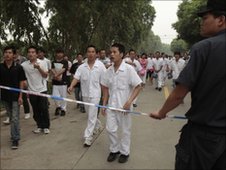Dingswayo
JF-Expert Member
- May 26, 2009
- 4,019
- 2,923
Can we make any parallels with Tanzania?
By Chris Hogg
BBC News, Shanghai

Workers briefly walked out on strike at a Honda factory in Guangdong One of China's most influential newspapers, the official People's Daily, has called for workers' incomes to be raised.
The paper says wages need to rise to protect stability and transform society.
It warns that what it calls the "made-in-China" model is facing a turning point.
The article did not mention a series of strikes which have been causing problems for foreign businesses.
Walkouts have paralysed several factories across China, including Honda factories in Tianjin and near Guangzhou, in Guangdong.
The strikes are a sensitive topic for the ruling Communist Party.
'Narrow the gulf' The People's Daily is the party's official newspaper. Analysts look for clues within its pages to what those who rule China really think.
Earlier this week, Premier Wen Jiabao called on officials to take greater care of migrant workers.
This commentary goes further. It says they should be paid more.
"The time has come to narrow the gulf between rich and poor which is stifling consumer demand here," the paper declares.
The All China Federation of Trade Unions says nearly a quarter of Chinese employees have not had a pay rise in five years.
But some of the workers who have gone on strike for higher wages in recent weeks have accused this organisation of colluding with local officials and factory managers to try to force staff back to work before their demands have been met.
It has been reported that the Chinese media have been banned from covering some of the recent strikes.
Certainly, the coverage there has been has focused on trouble at foreign-owned firms.
That could be because savvy workers feel they have more chance of getting a result by striking at a foreign firm, as the companies are concerned about their image in China and abroad.
Local firms may not care so much about what people think about the wages they pay their staff.
Or it could be that the censors are more willing to allow news about problems at foreign-owned firms to leak out, to create the impression that there are far fewer problems in Chinese-owned factories.
By Chris Hogg
BBC News, Shanghai

Workers briefly walked out on strike at a Honda factory in Guangdong One of China's most influential newspapers, the official People's Daily, has called for workers' incomes to be raised.
The paper says wages need to rise to protect stability and transform society.
It warns that what it calls the "made-in-China" model is facing a turning point.
The article did not mention a series of strikes which have been causing problems for foreign businesses.
Walkouts have paralysed several factories across China, including Honda factories in Tianjin and near Guangzhou, in Guangdong.
The strikes are a sensitive topic for the ruling Communist Party.
'Narrow the gulf' The People's Daily is the party's official newspaper. Analysts look for clues within its pages to what those who rule China really think.
Earlier this week, Premier Wen Jiabao called on officials to take greater care of migrant workers.
This commentary goes further. It says they should be paid more.
"The time has come to narrow the gulf between rich and poor which is stifling consumer demand here," the paper declares.
The All China Federation of Trade Unions says nearly a quarter of Chinese employees have not had a pay rise in five years.
But some of the workers who have gone on strike for higher wages in recent weeks have accused this organisation of colluding with local officials and factory managers to try to force staff back to work before their demands have been met.
It has been reported that the Chinese media have been banned from covering some of the recent strikes.
Certainly, the coverage there has been has focused on trouble at foreign-owned firms.
That could be because savvy workers feel they have more chance of getting a result by striking at a foreign firm, as the companies are concerned about their image in China and abroad.
Local firms may not care so much about what people think about the wages they pay their staff.
Or it could be that the censors are more willing to allow news about problems at foreign-owned firms to leak out, to create the impression that there are far fewer problems in Chinese-owned factories.